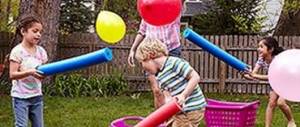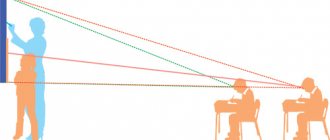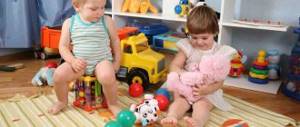Presentation for parents of the younger group: Adaptation of children in preschool educational institutions
Consultation for parents (with presentation) “Adaptation of young children to kindergarten conditions”
It is very difficult for children of any age to start attending kindergarten.
Each of them goes through a period of adaptation to kindergarten. (slide 2)
The child’s whole life changes dramatically.
Changes literally burst into the usual, established life in the family: a clear daily routine, the absence of relatives and friends, the constant presence of peers, the need to listen and obey unfamiliar adults, the amount of personal attention sharply decreases. The problem of adaptation of children in preschool age has been studied by many scientists who have conducted research and proven that the adaptation period mainly depends on how the adults in the family prepare the child for this important period. The child’s further development and prosperous existence in kindergarten and in the family depend on how the child gets used to the new daily routine, to unfamiliar adults and peers (slide 3).
If educators and parents join forces and provide the child with protection, emotional comfort, an interesting and meaningful life in kindergarten and at home, then this will be the key to the optimal course of adaptation of young children to kindergarten.
The adaptation period can be divided into 3 stages (slide 4)
.
1. Preparatory. It should start 1-2 months before the child is admitted to kindergarten. The task of this stage is to form such stereotypes in the child’s behavior that will help him painlessly join new conditions. The correction must be carried out at home, and much attention should be paid to developing independence skills. 2. Basic. The main task of this stage is to create a positive image of the teacher. Parents should understand the importance of this stage and try to establish a friendly relationship with the teacher. The teacher, getting to know the child, according to the parents, will be able to find an approach to the child much faster and more accurately, and the child will in due time begin to trust the teacher, while experiencing a sense of physical and mental protection. 3. Final. In the process of habituation, the child’s mood, well-being, appetite are first normalized, and lastly, sleep. Currently Time is distinguished by 3 degrees of the adaptation process (slide 5)
: 1. Light degree.
It is characterized by minor deviations in behavior, such as temporary disturbances of sleep, appetite, rare diseases, whims, aggression, isolation are possible. The main symptoms disappear within 2-3 weeks, maximum 1 month. 2. Average degree of adaptation: all violations become pronounced, diseases are recorded. Speech is either not used or speech activity slows down. In the game, the child does not use the acquired skills; the game is situational. 3. A severe degree of adaptation (from 2 to 6 months) is accompanied by a gross violation of all manifestations and reactions of the child. This is a decrease in appetite, a sharp disturbance in sleep, the child often avoids contact with peers, tries to retire, there is a manifestation of aggression, a depressed state for a long time. Typically, visible changes occur in speech and motor activity, and a temporary delay in mental development is possible. The main reasons for difficult adaptation to the conditions of a preschool educational institution, you can see in the following. slide (slide 6)
.
Sometimes parents themselves provoke the manifestation of difficulties in the child’s adaptation. Such parents are often authoritarian, enter into competition with teachers, and demonstrate their supercompetence in all matters. Affects the adaptation and type of temperament of the child. It has been noticed that sanguine and choleric people quickly get used to new conditions. But phlegmatic and melancholic people have a hard time. They are slow and therefore cannot keep up with the pace of life in kindergarten: they cannot quickly get dressed, get ready for a walk and complete the task. Research by teachers and doctors shows that the nature of adaptation depends on factors that you can see on slide 7.
For example, children under 2 years of age are more difficult to adapt to new conditions.
By this age, they become more inquisitive, understand adult speech well, and have richer experience of behavior in different conditions. Or, for example, when a child’s objective activity has been formed, it is easier to interest him in a new toy or activity. (Slide
The most important thing for a teacher is to win the child’s trust and affection. You need to make him feel that he is understood and accepted for who he is. Therefore, it is very important for the teacher to organize work with the family. If parents and preschool employees join their efforts and provide protection, emotional comfort, interesting and meaningful life for the child in kindergarten and at home, then we can say with confidence that the change that has occurred in the child’s life is for his benefit. Forms of interaction with parents are constantly changing. The traditional form of work, where the main place was given to messages and reports have lost their importance due to low efficiency. New, active forms of work with parents are increasingly being used, such as family clubs, circle tables, seminars, interest clubs, etc., which allow parents to be involved in the life of the kindergarten. You can also organize round tables with newcomers, involving parents of older students to exchange experiences.When a child begins to cheerfully talk about kindergarten, read poetry, and retell the events that happened during the day, this is a sure sign that he has settled down.
(Slide 9)
It’s difficult to say how long the adaptation period will last, because all children go through it differently.
But getting used to a preschool institution is also a test for parents, an indicator of how ready they are to support the child and help him overcome difficulties. (Slide 10)
To facilitate the child’s adaptation, I have developed a “Children’s Adaptation Plan”, a number of recommendations and consultations for parents, and I am also working to develop a general strategy for the upbringing and development of the child in the family and preschool educational institution.
(Slide 11) Slide 12.
Thank you for your attention!
Presentation on the topic: Adaptation of young children to kindergarten conditions
We recommend watching:
Adaptation of children to kindergarten Adaptation of young children to kindergarten Adaptation of a 2-year-old child in kindergarten. Material from the experience of a teacher: Adaptation of a child to kindergarten
Similar articles:
Adaptation of a child in kindergarten
Adaptation of children to kindergarten. Tips and tricks. - presentation
Adaptation of children to kindergarten. Tips and tricks
Make sure that kindergarten is necessary for your family now, since parents' hesitations are passed on to children. It is necessary to bring the daily routine at home closer to the kindergarten routine. If your child falls asleep only with the help of an adult, try to change this habit (it is better to do this at home long before entering kindergarten). Teach your children to eat a variety of dishes and consume soups and cereals daily. It is advisable to teach your child to eat, undress and dress independently, wash his hands, etc. by the time he enters kindergarten. The child will feel more confident. It is necessary to send a child to kindergarten only if he is healthy. Prepare your baby to communicate with other children, visit playgrounds, parks, and go on visits. Teach how to communicate with others (how to ask something, get acquainted, ask, etc.) Prepare the child for temporary separation from family, instill in him that kindergarten is fun and interesting. It is advisable to get to know the children of the group and teachers in advance. Do not send your child to kindergarten during the “three-year crisis.” “How to prepare a child for entering kindergarten”
“Rules of behavior for adults during the adaptation period” Useful recommendations: In the presence of a child, avoid making critical remarks about the kindergarten and its employees. Try not to be nervous and not to show your anxiety. On weekends, do not suddenly change your child’s daily routine. Constantly pay attention to deviations in the baby’s behavior and health. Do not wean yourself from bad habits during the adaptation period. Create a calm, conflict-free environment in the family. Dress your child neatly in kindergarten, in accordance with the air temperature in the group. Support your baby emotionally: hug, stroke, and call him affectionate names more often. Be more tolerant of whims. Don’t punish, don’t “scare” with kindergarten, pick up on time. When the child gets used to the new conditions, do not take his tears when parting seriously - this may simply be caused by a bad mood
“Rules of behavior for adults during the adaptation period” Do not discuss problems related to kindergarten that concern you in front of your baby. Send your child to kindergarten only if he is healthy. Find out in advance all the new moments in the daily routine in kindergarten and introduce them into the child’s daily routine at home. Increase the role of hardening activities. Enroll in a kindergarten at your place of residence. Set up your child as positively as possible before he enters kindergarten. “Reveal the secrets” to the child of possible communication skills with children and adults. Do not threaten your child with kindergarten as a punishment for childhood sins, as well as for disobedience. Prepare your child for temporary separation from you and let him understand that this is inevitable just because he is already big. Do not be nervous and do not show your anxiety on the eve of your child entering kindergarten. Plan your vacation so that during the first month of your child’s visit to a new organized group, you have the opportunity to leave him there for more than a whole day. Explain to your child all the time that he is as dear and loved to you as before.
How best to say goodbye Let's try to find a recipe for a good and healthy goodbye for a child. To do this, let’s remember what we know about the baby’s desires and decide what the adult wants. So, the child wants: - to know where mom is going; - know when she will come; - be sure that nothing will happen to him; - be sure that nothing will happen to her; - to be sure that she enjoys what she does, and she is no worse off there (although not better) than here. At the same time, the adult wants to: - ensure the safety of the child; - don’t be late where you are going; - leave the child in a fairly good mood; - when you return, you see the joy of meeting in the eyes of your baby. We will try to combine these wishes in one strategy. - In order not to be late and have the opportunity to say goodbye to your child, get ready 5-10 minutes earlier (no longer necessary, so as not to turn farewell into an independent event of the day).
- Tell your child honestly where and why you are going (just very simply, for example: “I’m going to the hairdresser to get my hair cut,” or “I’m going to work to type on the computer,” or “I’m going to Aunt Lena’s for tea”). Don’t be afraid that the child won’t understand the words: a calm, open intonation will tell him that the place where mom is going is good enough, and the thing she will do is useful and pleasant. - Tell the baby exactly when you will return. To do this, you do not need to tell the time by the clock (this may not be entirely convenient and understandable for a small child). You can say: “I’ll come when you eat, take a walk, or sleep.” The child understands more clearly specific descriptions of events, by which he will determine the time. — Tell your son or daughter who he will stay with and, most importantly, what he will do: “You will be with your grandmother. You will eat, then take a walk, then play, and then you will meet me together.” - Don’t promise your child “prizes” for letting you go, but if he asks you to bring him something, don’t refuse. If it is impossible to fulfill his request, immediately tell him about it: “Well, no, I can’t bring you a live chicken...” Even if the child does not ask for anything, bring him from time to time some small pleasant thing (cookies, candy, apple, notebook) so that he feels that somewhere far from him you remember about him and are preparing for the meeting
1. easy adaptation: -temporary sleep disturbance (normalizes within 7-10 days); -appetite (normal after 10 days); -inadequate emotional reactions (whims, isolation, aggression, depression, etc.), changes in speech, orientation and play activity return to normal within days; - the nature of relationships with adults and physical activity practically do not change; -functional disorders are practically not expressed, normalize in 2-4 weeks, no diseases occur. The main symptoms disappear within a month (2-3 weeks is normal). There are different degrees of severity of adaptation to kindergarten:
2. Average adaptation: all disorders are more pronounced and last for a long time: sleep, appetite are restored within days, orientation activity (20 days), speech activity (30-40 days), emotional state (30 days), motor activity undergoing significant changes, returns to normal within days. Interaction with adults and peers is not impaired. Functional changes are clearly expressed, diseases are recorded (for example, acute respiratory infection). 3. Severe adaptation (from 2 to 6 months) is accompanied by a gross violation of all manifestations and reactions of the child. This type of adaptation is characterized by a decrease in appetite (sometimes vomiting occurs during feeding), severe sleep disturbances, the child often avoids contact with peers, tries to retire, there is a manifestation of aggression, a depressed state for a long time (the child cries, is passive, sometimes there are wave-like changes in mood) . Usually visible changes occur in speech and motor activity, and a temporary delay in mental development is possible. With severe adaptation, as a rule, children get sick during the first 10 days and continue to get sick again throughout the entire period of getting used to a group of peers.
4. Very difficult adaptation: about six months or more. The question arises whether the child should stay in kindergarten; perhaps he is a “non-kindergarten” child. However, no matter how a child is prepared for preschool education, he is still, especially in the first days, in a state of stress. The child's temperament type influences adaptation. It has been noticed that sanguine and choleric people quickly get used to new conditions. But phlegmatic and melancholic people have a hard time. They are slow and therefore cannot keep up with the pace of life in kindergarten: they cannot quickly get dressed, get ready for a walk, eat, or complete a task. They are often pushed on, not only in kindergarten, but also at home, without giving them the opportunity to be with themselves. Practice shows that the main reasons for difficult adaptation to the conditions of a preschool educational institution are: - the absence in the family of a regime that coincides with the regime of a preschool institution, - the presence of peculiar habits in the child, - the inability to occupy oneself with a toy, - the lack of basic cultural and hygienic skills, - the lack of communication skills with strangers.
Don't make mistakes Unfortunately, sometimes parents make serious mistakes that make it difficult for their child to adapt. What you should not do under any circumstances: You should not punish or get angry with your baby because he cries when parting or at home when the need to go to kindergarten is mentioned! Remember, he has the right to such a reaction. A stern reminder that “he promised not to cry” is also absolutely ineffective. Children of this age do not yet know how to “keep their word.” It’s better to remind you again that you will definitely come. You can’t scare them with kindergarten (“If you behave badly, you’ll go to kindergarten again!”). A place that is feared will never be loved or safe. You cannot speak badly about the teachers and the kindergarten in front of your child. This may lead the child to think that the garden is a bad place and he is surrounded by bad people. Then the anxiety will not go away at all. You cannot deceive the child by saying that you will come very soon if the baby, for example, has to stay in kindergarten for half a day or even a full day. Let him know better that his mother will not come soon than to wait for her all day and may lose trust in the person closest to him.
Mom also needs help! When it comes to adapting a child to kindergarten, a lot is said about how difficult it is for the baby and what help he needs. But “behind the scenes” there remains one very important person - my mother, who is in no less stress and worry! She also desperately needs help and almost never receives it. Often mothers do not understand what is happening to them and try to ignore their emotions. But you shouldn't do this. You are entitled to all your feelings, and in this case they are natural. Entering kindergarten is the moment when mother and child separate, and this is a test for both. The mother’s heart also “breaks” when she sees how the baby is worried, but at first he may cry only at the mere mention that tomorrow he will have to go to the garden.
To help yourself, you need to: Be sure that visiting the garden is really necessary for the family. For example, when a mother simply needs to work in order to make her contribution (sometimes the only one) to the family income. Sometimes mothers send their child to kindergarten earlier than they go to work to help him adapt, picking him up early if necessary. The fewer doubts a mother has about the advisability of visiting the kindergarten, the more confidence that the child will sooner or later cope. And the baby, reacting precisely to this confident position of the mother, adapts much faster. to believe that the baby is in fact not a “weak” creature at all.
The child’s adaptation system is strong enough to withstand this test, even if the tears flow like a river. It’s paradoxical, but true: it’s good that the baby is crying! Believe me, he has real grief, because he is breaking up with the person he loves most - you! He doesn’t yet know that you will definitely come; a routine has not yet been established. But you know what is happening, and you are sure that you will pick up the baby from the kindergarten. It is worse when the child is so caught in the grip of stress that he cannot cry. Crying is an assistant to the nervous system; it prevents it from being overloaded. Therefore, do not be afraid of the child’s crying, do not be angry with the child for “whining.” Of course, children's tears make you worry, but you will definitely get through it too.







